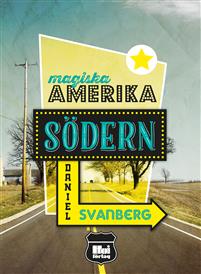Magiska Amerika Södern was a free choice I allowed myself at the library, despite a pretty heavy bookish agenda. (My book club roster now includes four different groups.) What would a Swede make of the American South?

Author: Daniel Svanberg
My GoodReads rating: 3 stars
Average GoodReads rating: 3.33 stars
Language scaling: N/A (only available in Swedish)
Summary: Daniel Svanberg spends nearly two weeks traveling throughout the American South, singing the praises of Southern cuisine and musical history and asking people why they love America.
Recommended audience: Anyone nostalgic for those halcyon days before the 2016 election
In-depth thoughts: The first thing I realized, when I sat down to write this post, was that I don’t think I ever wrote about Amerikanskt here, which is a tragedy.
And the fact that my first instinct, with this book, is to think about another book pretty much says it all. Svanberg is often self-aware enough to recognize that he is a naive and wide-eyed wanderer (his own language, not mine) but he glosses over those moments in favor of enthusing over roadside diners, sweet tea, and the blues. You can’t blame him for that, of course, but the result is that the book tows a weird line. Svanberg seems like he’s self-aware enough to know that he’s not really digging very deeply here, and yet he makes no comment at all on the lack of depth. There is engagement with the more brutal and inhumane parts of America’s history that played out in the South but it feels very pat and surface-level: glib statements about how terrible slavery and Jim Crow was, but no connection to the legacy that remains even today; an enthusiastic nostalgia for Americana and everything the “retro” vibe entails without considering the flip side of that coin.
There are a couple other conceits that run throughout the book: images of heavenly choirs are invoked at almost every meal, surreal dreams about the day’s travels close the end of every day, and “The Shadow,” a metaphor (if heavy-handed) for his own depression and despair over…not ever really understanding America, I guess?…is a constant companion.
If I were a Swede reading this, I think I’d be disappointed. The over-reliance on the above cutesy conceits takes up valuable word real estate; the resulting pictures painted are neither broad nor detailed. But I’m not Swedish! I’ve even done my own (shorter) road trip through the region from Pennsylvania to North Carolina and back, up and down the Blue Ridge Parkway. I don’t need someone to tell me what it’s like; I’ve been there.
Instead, the value I got from it was the little Swedish observations, similar to comments my sambo would make during his visits over Christmas and New Year’s. (“The cars here are HUGE.” “Wow, that’s a lot of churches for such a small town.”) And that’s something you really have to actually be American to appreciate: having someone comment on the Tarantino-esque “little differences” you’d never notice yourself because it’s such an ingrained part of your existence. The cars have always been this size; there have always been three different churches in this tiny little village of only a couple hundred people. Why would it ever be any different?
My favorite that Svanberg points out is the little red flag on American mailboxes you flip up to indicate that there’s mail inside, either to pick up or to be delivered. Of course that’s different between the two countries; I just never would have considered Sweden’s lack of a little red flag on mailboxes something worth remarking on. I can say with 100% certainty that I never felt like it was something missing here. Only when someone else pointed it out did I realize “Oh, I guess maybe that would be something weird and noteworthy if you grew up literally anywhere else.”
Sadly, those moments were few and far between, and more ink was spilled on little metaphorical asides about The Shadow that I feel a little guilty for not enjoying because it seems like Svanberg was really aiming for pathos with them. Most of the time the book felt a little slow and draggy without really digging too deeply, even though the writing itself was pretty peppy and engaging. Other Americans might enjoy an outsider’s perspective on their own country, but at the end of the day, Amerikanskt is the better book.
